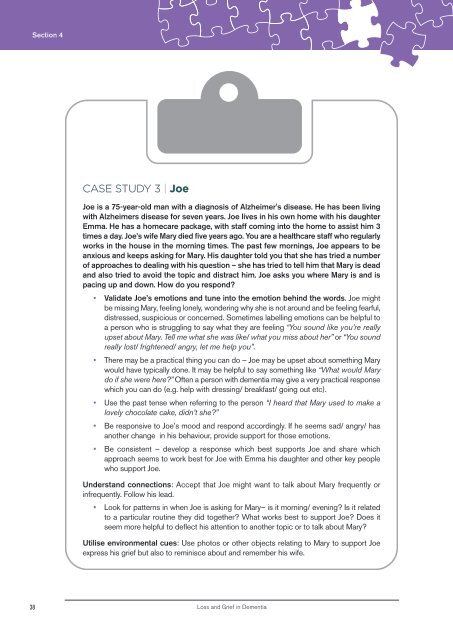Loss and Grief in Dementia
Final-Guidance-Document-3-Loss-Grief
Final-Guidance-Document-3-Loss-Grief
Create successful ePaper yourself
Turn your PDF publications into a flip-book with our unique Google optimized e-Paper software.
Section 4<br />
CASE STUDY 3 | Joe<br />
Joe is a 75-year-old man with a diagnosis of Alzheimer's disease. He has been liv<strong>in</strong>g<br />
with Alzheimers disease for seven years. Joe lives <strong>in</strong> his own home with his daughter<br />
Emma. He has a homecare package, with staff com<strong>in</strong>g <strong>in</strong>to the home to assist him 3<br />
times a day. Joe’s wife Mary died five years ago. You are a healthcare staff who regularly<br />
works <strong>in</strong> the house <strong>in</strong> the morn<strong>in</strong>g times. The past few morn<strong>in</strong>gs, Joe appears to be<br />
anxious <strong>and</strong> keeps ask<strong>in</strong>g for Mary. His daughter told you that she has tried a number<br />
of approaches to deal<strong>in</strong>g with his question – she has tried to tell him that Mary is dead<br />
<strong>and</strong> also tried to avoid the topic <strong>and</strong> distract him. Joe asks you where Mary is <strong>and</strong> is<br />
pac<strong>in</strong>g up <strong>and</strong> down. How do you respond?<br />
• Validate Joe’s emotions <strong>and</strong> tune <strong>in</strong>to the emotion beh<strong>in</strong>d the words. Joe might<br />
be miss<strong>in</strong>g Mary, feel<strong>in</strong>g lonely, wonder<strong>in</strong>g why she is not around <strong>and</strong> be feel<strong>in</strong>g fearful,<br />
distressed, suspicious or concerned. Sometimes labell<strong>in</strong>g emotions can be helpful to<br />
a person who is struggl<strong>in</strong>g to say what they are feel<strong>in</strong>g “You sound like you’re really<br />
upset about Mary. Tell me what she was like/ what you miss about her” or “You sound<br />
really lost/ frightened/ angry, let me help you”.<br />
• There may be a practical th<strong>in</strong>g you can do – Joe may be upset about someth<strong>in</strong>g Mary<br />
would have typically done. It may be helpful to say someth<strong>in</strong>g like “What would Mary<br />
do if she were here?” Often a person with dementia may give a very practical response<br />
which you can do (e.g. help with dress<strong>in</strong>g/ breakfast/ go<strong>in</strong>g out etc).<br />
• Use the past tense when referr<strong>in</strong>g to the person “I heard that Mary used to make a<br />
lovely chocolate cake, didn’t she?”<br />
• Be responsive to Joe’s mood <strong>and</strong> respond accord<strong>in</strong>gly. If he seems sad/ angry/ has<br />
another change <strong>in</strong> his behaviour, provide support for those emotions.<br />
• Be consistent – develop a response which best supports Joe <strong>and</strong> share which<br />
approach seems to work best for Joe with Emma his daughter <strong>and</strong> other key people<br />
who support Joe.<br />
Underst<strong>and</strong> connections: Accept that Joe might want to talk about Mary frequently or<br />
<strong>in</strong>frequently. Follow his lead.<br />
• Look for patterns <strong>in</strong> when Joe is ask<strong>in</strong>g for Mary– is it morn<strong>in</strong>g/ even<strong>in</strong>g? Is it related<br />
to a particular rout<strong>in</strong>e they did together? What works best to support Joe? Does it<br />
seem more helpful to deflect his attention to another topic or to talk about Mary?<br />
Utilise environmental cues: Use photos or other objects relat<strong>in</strong>g to Mary to support Joe<br />
express his grief but also to rem<strong>in</strong>isce about <strong>and</strong> remember his wife.<br />
38<br />
<strong>Loss</strong> <strong>and</strong> <strong>Grief</strong> <strong>in</strong> <strong>Dementia</strong>


